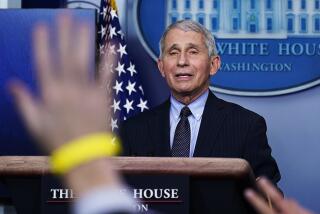Bacteria That Breed Political Intrigue
- Share via
What did David Goldfarb do? Life may sometimes imitate art, but in the case of David Goldfarb it is more likely that art, in the form of Soviet intrigue, is still catching up to life.
We know that the 68-year-old Soviet Jewish molecular biologist won international attention in April, 1984, just three days before his scheduled departure for Israel. That day in Moscow the KGB raided his home, confiscating papers and his bacteria collection. The latter contained mutant strains of E coli K-12, all but two of which he had obtained from Poland, the United States or Great Britain. The last two were, indeed, Soviet strains, but they had been available on request to any microbiologist in the world for more than a decade.
Nonetheless the KGB kept his exit visa and accused him of having been caught in the act of committing treason.
Goldfarb had been the head of the Laboratory of Bacteria and Bacteriophage of the Soviet Academy of Science in Moscow until his application to emigrate to Israel in 1979 lost him that post. Before that, in the early ‘60s, he had been among those Soviet biologists who reinvigorated Soviet molecular biology after it was freed from decades of “Lysenkoism,” a crack-pot theory supported by Stalin. He had then gone abroad to learn the new science, but had never held security clearance or had any connection with secret research.
So Goldfarb has not been able to accept the post offered him at the Weisman Institute in Israel or see his son, Alex, who emigrated in 1975 and is on the faculty at Columbia University.
In 1984 Goldfarb’s predicament seemed to some people to reflect Soviet insecurity over their own lagging program in recombinant DNA and molecular biology in general. At the time it seemed that leading figures in the Academy hoped for rapprochement with the West and hoped that letting Goldfarb emigrate would improve relations. They could not have been happy with the letter signed by 17 Nobel Laureates demanding that Goldfarb be allowed to leave with his family.
Other Soviet-watchers speculated that Goldfarb had become involved in a battle over turf between the Soviet Academy of Sciences, who had given him his visa, and the KGB. The academy was sensitive to the feelings of Western scientists and feared a general cooling of relations. The KGB, on the other hand, wanted, for its own purposes, to keep Goldfarb.
As it turned out, some of the academicians’ fears came to pass. In protest of Goldfarb’s retention in the Soviet Union, the Committee for Concerned Scientists has supported a moratorium on sending any bacterial or biological strains to the Soviet Union.
Since 1984 Goldfarb has joined a list of scientific “refuseniks” who, having voiced a desire to quit their homeland, are refused visas but lose their scientific affiliations, falling into the no-man’s-land of laboratoryless, institutionless scientists for whom personal achievement slowly becomes impossible as they are denied official collaboration with their peers, as well as the right to join the foreign laboratories to which they have been invited.
These last years have not been uneventful for David Goldfarb. He is a diabetic who lost one leg at the battle of Stalingrad. Now suffering with gangrene, he needs to have the remaining one amputated. His son Alex reports that the surgery has been postponed and he fears that treatment will be withheld until it is too late.
I learned about David Goldfarb’s predicament in accounts of Nicholas Daniloff’s life in Moscow. It seems that the men are friends. Daniloff had been providing Goldfarb with new genetically engineered insulin from the United States and had been visiting him in the hospital.
Daniloff’s unsought celebrity has disclosed why the KGB was out to get Goldfarb two years ago. It wasn’t those little E coli, after all, that enraged them. As a friend of Daniloff, Goldfarb had refused to perform the “errand” that was carried out two years later by Misha. Goldfarb had been asked to slip compromising documents into papers he was giving Daniloff. And he refused.
The gold ring of freedom was within Goldfarb’s grasp, and he let it go by rather than betray a trust. It is urgent now that pressure be exerted so that David Goldfarb can seek medical help in the West. He is a man of conscience who is also an able scientist, and his time may be running out.





